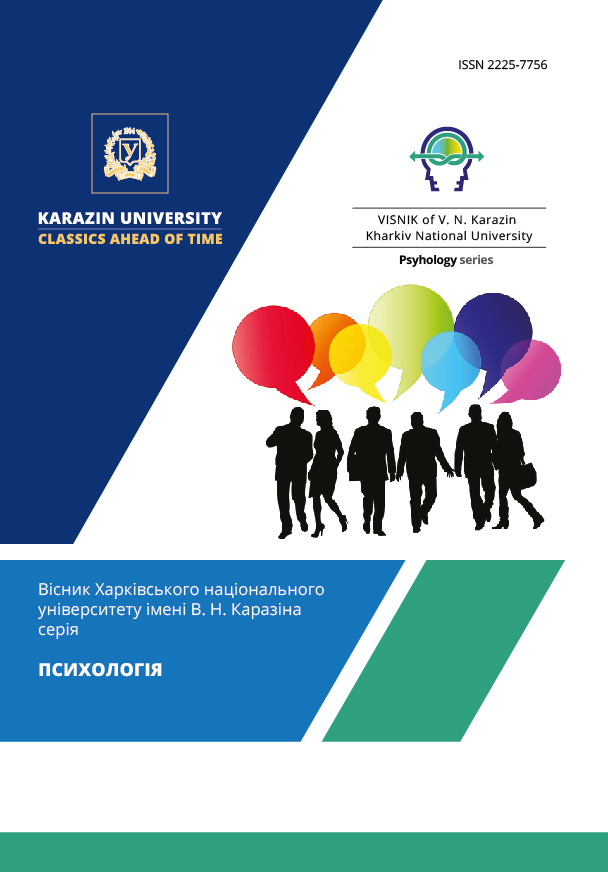Зв’язок копінг-стратегій з стилями саморегуляції поведінки та особистісною зрілістю в хлопців та дівчат студентського віку
Анотація
У статті розглядається питання зв’язку між мірою використання копінг-стратегій та сформованістю компонентів системи саморегуляції й особистісною зрілістю у хлопців та дівчат, студентів гуманітарних спеціальностей молодших курсів ЗВО. Дівчата в першу чергу використовують копінг втечі-уникнення, в останню – планування рішення проблеми. Хлопці найчастіше вдаються до самоконтролю, статистично частіше за дівчат, найрідше – до пошуку соціальної підтримки. У стилі саморегуляції дівчат домінує процес оцінювання результатів, у юнаків – планування та моделювання. Молоді люди у середньому досягли задовільного загального рівня особистісної зрілості. І дівчатам, і хлопцям притаманний задовільний рівень мотивації досягнення; життєва настанова задовільно сформована у дівчат; здатність до психологічної близькості та почуття громадянського обов’язку розвинені на задовільному рівні в хлопців. Відмінності за почуттям громадського обов’язку є статистично значущими. Отримані кореляції між копіг-стратегіями та компонентами системи саморегуляції виявились переважно негативними. Тобто використання певних механізмів долаючої поведінки відбувається поза системи саморегуляції діяльності. Так у хлопців як окремі саморегуляційні процеси зворотно пов’язані з більшістю копінг-стратегії, так і загальний рівень саморегуляції зворотно пов’язаний з пошуком соціальної підтримки. У дівчат поряд зі зворотними зв’язками присутні й прямі, у тому числі розвиненість системи саморегуляції загалом прямо пов’язана з копінгом планування рішення проблеми, а зворотно – з дистанціювання. Дівчата за мірою набуття особистісної зрілості більше схиляються до стратегії позитивної переоцінки та менше до втечі-уникнення. Хлопці за мірою оптимізації Я-концепції більш тяжіють до стратегії планування рішення проблеми.
Завантаження
Посилання
Dubchak, H.M. (2018). Analysis of coping strategies of modern students. Aktualʹni problemy psykholohiyi: Zbirnyk naukovykh pratsʹ Instytutu psykholohiyi imeni H.S. Kostyuka NAPN Ukrayiny. Psykhofiziolohiya. Psykholohiya pratsi. Eksperymentalʹna psykholohiy. (5)18, 55-63. https://lib.iitta.gov.ua/720188/1/%D0%94%D1%83%D0%B1%D1%87%D0%B0%D0%BA_2018.pdf [In Ukrainian]
Ihumnova, O.B. (2019). Empirical study of coping-behavior strategies and self-regulatory students-psychologists. Naukovyy visnyk Khersonsʹkoho derzhavnoho universytetu. Seriya: Psykholohichni nauky, (2), 57-64. https://doi.org/10.32999/ksu2312-3206/2019-2-8 [in Ukrainian].
Pichurin, V. V. (2018). Theoretical and methodological bases of psychophysical training of students of engineering specialties in the process of physical education. Avtoreferat dysertatsiyi na zdobuttya naukovoho stupenya doktora nauk z fizychnoho vykhovannya ta sportu. https://repository.ldufk.edu.ua/bitstream/34606048/17043/1/pichurin_v_v.pdf. [In Ukrainian]
Reznikova, O.A., Shamardina, A.V. (2017). Coping straiegies and coping resources in the structure of coping behavior of student personality. Naukovyy visnyk Khersonsʹkoho derzhavnoho universytetu. Seriya: Psykholohichni nauky, 6(2), 80-85. http://nbuhttp://irbis-nbuv.gov.ua/cgi-bin/irbis_nbuv/cgiirbis_64.exe?C21COM=2&I21DBN=UJRN&P21DBN=UJRN&IMAGE_FILE_DOWNLOAD=1&Image_file_name=PDF/nvkhp_2017_6%282%29__17.pdf v.gov.ua/UJRN/nvkhp_2017_6%282%29__17 [In Ukrainian]
Shebanova, V.I., Didenko, H.O. (2018). Coping-behavior in modern psychological researches. Problemy suchasnoyi psykholohiyi: Zbirnyk naukovykh pratsʹ K-PNU imeni Ivana Ohiyenka, Instytutu psykholohiyi imeni H.S. Kostyuka NAPN Ukrayiny, 39, 368 379. https://doi.org/10.32626/2227-6246.2018-39.368-379 [In Ukrainian]
Solomka, Е. Т., Khoma, Т. V., Khlopek, А. В. (2021). Coping behavior of a personality in psychological research and some methods of stress management. Naukovyy visnyk Uzhhorodsʹkoho natsionalʹnoho universytetu. Seriya Psykholohiya, (2), 24-27. https://doi.org/10.32782/psy-visnyk/2021.2.5 [In Ukrainian]
Yarosh, N.S., Rozumna, M. V. (2020). Features of coping strategies of students who were brought up in an incomplete family. Visnyk Kharkivsʹkoho natsionalʹnoho universytetu imeni V. N. Karazina. Seriya Psykholohiya, (69), 29-36. https://doi.org/10.26565/2225-7756-2020-69-04 [In Ukrainian]
Цитування
Humor as One of the Coping Behavior Strategies
Iavorovska Lubov & Cherkaska Olena (2023) Visnyk of V. N. Karazin Kharkiv National University. A Series of Psychology
Crossref




